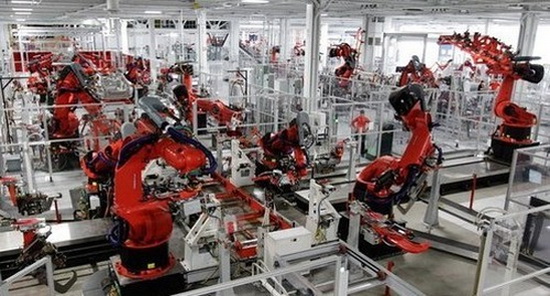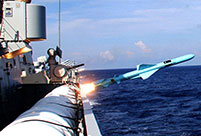

 |
| On the production line at a company in Foshan, Guangdong of China, only a few workers are doing the finishing job of packing, and robots grab the packages and put them on the cart in order. (Photo/China Business News) |
In the Pearl River Delta region, the phenomenon of replacing workers with robots is becoming very common. Since robots are much more efficient, using them instead of workers is now a "New Norm" in the Pearl River Delta area, signifying that a promising new industry is rising.
"Several years ago, if you recommend using robots to replace workers to those factories, you probably would be kicked out. But any kind of topic related to robots can now attract many companies and factories to participate. The development of the robot industry is embracing unprecedented opportunities," said Li Zexiang, professor of Hong Kong University of Science and Technology.
"World factory" Dongguan is the first experiencing a wave of robots replacing people. Since 2013, Dongguan City Government invests 200 million yuan each year to encourage companies replacing people with robots. A microtechnic company opened the first unmanned factory in Dongguan. In its workshop, 60 robots are working on a cellphone part 24/7. They are divided into 10 production lines, supervised by only 3 workers. Only months ago, this work had to be done by 650 people. Besides increasing efficiency, robots are also being used in critical working conditions like environments with smoke and pollution. These robots work 3 times more efficiently than workers, with the percent of pass raising from 80 percent to 99.8 percent.
China Business News estimates that over 500 companies and factories in the Pearl River Delta region that are using or related to robots, amounting over 100 billion yuan worth of total output value. As prosperous as this industry seems, there are still some problems that need to be solved.
First of all, domestic capabilities in the production of high-end intelligent equipment are still insufficient. The machines that companies have introduced have mostly been imported from abroad. Second, professional technicians and researchers are also in short supply domestically. With the import of more high-tech machines, more professional technicians and researchers are also needed in the market. Moreover, to fully accomplish a project requires a great amount of investment, and it takes 2, 3 years, or even longer to recover the costs. Should a market fall and orders dry up, a company can find itself with idle capacity. That risks trapping it in a vicious circle.
As a result, business should avoid blindly following suit in this replacement project, but comprehensively consider capabilities, capital, market, technical support, and other basic management factors before making any decision.
This article is edited and translted from 《“机器换人”席卷珠三角》,source: China Business News, author: Lan Zhixin
 Shocking scenes found in 4000-year-old earthquake relic
Shocking scenes found in 4000-year-old earthquake relic Female soldiers add color to military parades
Female soldiers add color to military parades Taiwan campus belle with gorgeous look
Taiwan campus belle with gorgeous look  Stunning photos of China’s fighters and airborne troops
Stunning photos of China’s fighters and airborne troops Mums stage breastfeeding flash mob
Mums stage breastfeeding flash mob PLA South China Sea Fleet conducts live fire exercise
PLA South China Sea Fleet conducts live fire exercise Beauty of Tsinghua University transforms into car model
Beauty of Tsinghua University transforms into car model Official shot having sex with two college girls
Official shot having sex with two college girls Moscow “spider-man” climbs Chinese skyscraper
Moscow “spider-man” climbs Chinese skyscraper Fiery freezer
Fiery freezer Bearly getting along
Bearly getting along Top luxury firms struggling in China
Top luxury firms struggling in China Japan reads too much into WWII parade
Japan reads too much into WWII paradeDay|Week